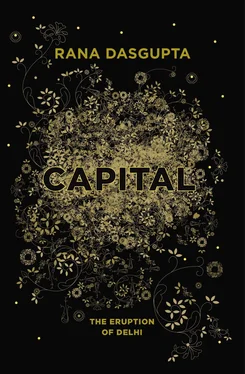The reason it is funny to invoke Koda as the richest man in Delhi is that he has only just arrived here. He has been moved from a jail in Jharkhand to Delhi’s Tihar Jail, in fact, so that he can continue to attend parliament. Which puts him in good company. The bus between Tihar Jail and the Parliament Building is not a lonely line to travel.
At some point in the conversation I am forced to make an exit so I can catch the last Metro. I bid farewell to the company, drunken by now. Gautam leaves with me, and drops me to the Metro station. It’s deserted. I get into an empty carriage. The air conditioning is powerful, the ride smooth. I feel drowsy. At the other end, I pick up my car and head for home.
I am nearly at the house when I see a peculiar sight. A woman in a glittery nightclub negligée is walking down the dark street, so unsteadily that it seems she might fall at any moment, and behind her, two men are following at walking pace on a motorbike. I am not sure what to do. It is well after midnight, and the woman seems oblivious to everything around her: not drunk, but flying on the wings of some other potion. I draw level and put down the passenger window.
“Are you okay?” I ask. She looks in the window. She cannot focus too well on my face.
“What did you say?”
“I just asked if you were okay.”
“Me? I’m fine!”
I watch her walk away. I put the window up. I look ahead, ready to drive on, and see that one of the men on the motorbike has run in front of my car, which he now proceeds to beat violently with both his palms. While he is doing so, the other man jerks open my car door and grabs my arm.
“Get out!”
“Why?”
“She is a prostitute. You are under arrest.”
“For what?”
“What did you say to her?”
“I asked her if she was okay.”
“How do you know her?”
“I don’t.”
“Get out of the car.”
“Who are you?”
“We are police.”
I get out of the car. I look around for the woman, who seems to have completely disappeared.
“Driver’s license?”
I can’t believe this situation. I get my driver’s license out, and I watch while he inspects it.
“Which country is this from?”
“The UK,” I say.
“You are British?”
“Yes,” I say. He looks at me strangely. He begins writing down the number of my driving licence. While he is doing so, I hear my car engine rev, and turn round to watch it being driven away by the other man.
“Where’s he going?” I cry.
“Police station.” He is unperturbed. I am dumbfounded. He continues making his quiet notes. Then he hands me back my driver’s license.
“Get on the bike.”
I climb on the back of the motorbike, and he drives away at speed in the direction already taken by my car. We whizz round dark corners and out into the neon sea of the main road. A U-turn, a side road, more dark corners, and finally the police station. My car is meekly parked out front, under a sign offering helpful advice to all who visit the Delhi police: “ A Person Who Has No Opinion Will Seldom Be Wrong ”.
There seem to be two opposite conclusions to draw from this, and I honestly don’t know which is the intended one.
I am led into a ramshackle office smelling of dust, sweat and stamp pads. A policeman is sitting behind a desk. He seems happy to see me in his net. My captor briefs him.
“What were you doing this evening?” the boss asks me.
“I was having dinner with friends.”
“Girlfriends?” he says, smiling.
“Friends.” I can see that he hopes I will turn out to be morally vulnerable. I resolve to act blasé. I don’t have much money on me.
“So you leave one girlfriend and think you can pick up another girlfriend?”
I do not answer.
“Why would you stop to talk to a woman in the street? In the middle of the night.”
We go over the details of the event again. He asks where I live, trying to place me in the Delhi galaxy. You never know with foreigners.
“Have you been drinking?” he asks.
“No,” I lie.
“Shall we go to the hospital and check?”
“Okay,” I say. This irritates him.
“What do you mean, ‘Okay’?” he barks. “Show me your driving license.”
I hand it to him and he makes a big show of inspecting every detail. I am not going to give him the satisfaction of hanging on his opinions. I look around. I’m actually a bit fascinated by this place, which is the most dilapidated seat of state power imaginable. Wires spill out of empty light sockets. There is a cardboard ceiling, in which holes have been rudely cut for the spinning fans to protrude. The walls are covered in phone numbers written at screwy angles and, behind every chair, dirty brown clouds where heads have leant. Someone has put up a sticker above a desk saying, “Sexi Hot Boy”. In the corner of the room is a shrine with statues of various gods.
The office is just a cleared-out corner, in fact, of a giant storeroom. All around is the most enormous accumulation of police paraphernalia. Road signs, traffic cones. Rows of megaphones on shelves. Piles of shoes and boots. Beds. Massive piles of old files.
Birdsong starts up in the room, which I realise is the ring tone of the policeman’s mobile phone. He answers it. “Yes sir,” he says solemnly. And again, “Yes sir.” I can hear a raised voice on the other end and realise he is being reprimanded. I know the consequences for me will be bad if I stand and watch his indignity, so I wander out of the open back door into the courtyard outside. Another policeman is draping wet laundry over the handlebars of the old scooters which are parked here in great numbers. In fact, as my eyes adjust to the light and I can see out across the courtyard, I realise there is here the most enormous expanse of rotting vehicles. Abandoned scooters, cars and auto-rickshaws, all broken and twisted, and jammed in together. I wander into the darkness, round the corner of the building. The trees here are old and tall, and bats flit overhead. The wreckage goes on and on. There must be fifty or sixty rotting police vans. Rusting traffic lights and police barricades. Unbelievably, there are two small aeroplanes jammed in at the end, half overgrown with grass.
I head back to the building. The policeman ignores me when I come back into the room. He is typing with one finger on a computer keyboard. I sit down. Another man comes in and sits next to me. His walkie-talkie keeps erupting with voices of the night. Listlessly, he picks up a shred of newspaper from the floor and tries to make out what the ripped-off article is all about.
The man behind the desk acknowledges me at last. He says,
“What would have happened if my men had not saved that woman from you?”
I feel he is running out of ammunition. He says,
“Would you like everyone to know what you do at night?”
I try deference. I call him “Sir”. I tell him again how it was.
He holds my driving license in the air and summons the cop sitting next to me.
“Photocopy.”
The man takes my driving license to the photocopy machine in the corner, whose sparkling newness contrasts with the general decrepitude. He presses the copy button but nothing happens. He turns back to the man behind the desk.
“No paper.”
The man behind the desk has a full packet of photocopy paper in front of him. He carefully takes from it one single sheet and hands it to his colleague, who opens the drawer of the machine and places it in the tray, closes the drawer, presses the button, and prints on it a copy of my driving license.
The boss hands me a pen.
“Sign,” he says.
I sign the copy of my driving license. For some reason. He throws the original down on the desk.
Читать дальше











